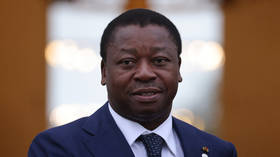African state scraps presidential elections
Civil society groups and opposition parties in Togo have criticized the new law, claiming it is an attempt to extend President Faure Gnassingbe’s 19-year rule
Togolese President Faure Gnassingbe has signed the West African country’s revised constitution, the government announced on Monday, despite opposition parties vowing to block it from becoming law.
Protests erupted in Togo after lawmakers passed the amended legislation late in March, abolishing presidential elections and empowering parliament to choose the president. It extends the presidential term from five to six years.
The decision also resulted in a nine-day extension of the parliamentary and regional elections, which were originally scheduled for April 20.
Opposition coalitions, including the National Alliance for Change (ANC) party, have denounced the reforms as an attempt to prolong Gnassingbe’s rule. The president has run the former French colony since 2005 after succeeding his father, Eyadema Gnassingbe, who ruled from 1967 until his death.
In a statement announcing the enactment on Monday, President Gnassingbe’s office claimed that the new constitution marks a “new stage in the institutional life” of the country and the “strengthening of democracy.”
However, a group that includes around 20 Togolese civil society organizations has called for protests, which the government banned last month, to demand the reinstatement of the old constitution.
“We will never accept this new constitution, even after its promulgation,” the Associated Press cited David Dosseh, a spokesperson for the group, as saying.
He argued that elections are “absolutely necessary for the people to choose a new president and finally achieve a democratic transition in Togo” when Gnassingbe’s current mandate expires in 2025.
The charter’s endorsement comes just days after the Electoral Commission (EC) declared that the ruling Union for the Republic (UNIR) party had won a majority of parliament seats in the April 29 legislative elections.
The coalition has won 108 of the 113 seats in parliament, according to preliminary results published by the EC late on Saturday.
Observers from the African Union, the West African regional bloc ECOWAS, and the Community of Sahel-Saharan States (CEN-SAD) expressed satisfaction about the “transparent nature” of the election, although opposition parties such as the Dynamic for the Majority of the People (DMP) have raised concerns about irregularities, including over-voting.
You can share this story on social media:








Comments are closed.